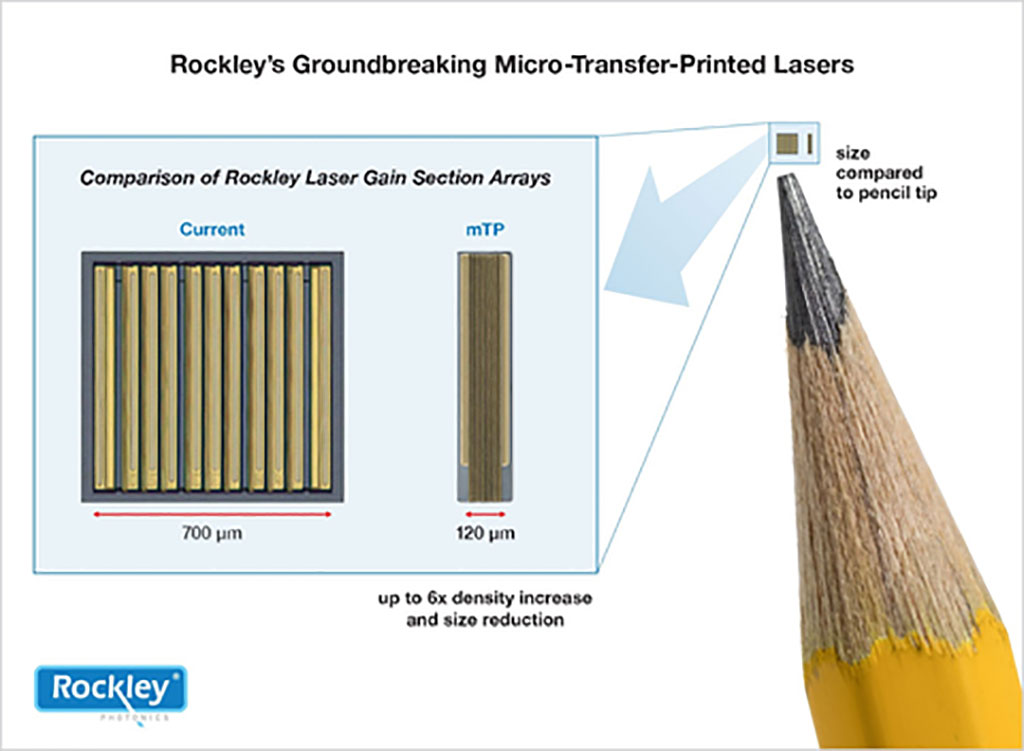New Chip Technology Paves Way for Tiny Wearable Devices to Detect and Measure Biomarkers
|
By HospiMedica International staff writers Posted on 23 Sep 2022 |

Scientists have developed what is believed to be the world’s first micro-transfer-printed (mTP) silicon-photonics-based laser for commercial applications. This groundbreaking achievement by Rockley Photonics Holdings Limited (Oxford, UK) is expected to allow the company to further increase the density and reduce the size of its high-density spectrophotometer chips - which are already the world’s smallest for broadband infrared wavelength laser spectrometry (covering 1000 nanometers of spectrum) and are smaller in area than LED-based solutions currently used in wearables. New silicon-photonics-based biosensing chips using mTP technology are expected to be available in the first half of 2024. This advancement could potentially have a significant impact across a wide range of applications, including the design of exceptionally small wearable devices for the detection and measurement of multiple biomarkers.
With this breakthrough in the mTP of silicon-photonics-based lasers, Rockley has dramatically increased the laser density of its photonics integrated circuits (PICs) for biosensing, creating what it believes to be the world’s highest-density broad-wavelength laser spectrophotometer chip, surpassing its own previous achievements. Moreover, the mTP process is expected to reduce manufacturing costs and enable thinner, smaller footprint and higher-density chip designs. These attributes are powerful benefits for use in consumer and medtech devices and could facilitate the integration of Rockley’s biosensing technology into future tiny wearables. Leveraging the mTP process, the new PIC technology will integrate a laser-generating “membrane” with a thickness of only 4 microns. The potential applications for this higher-density and smaller-footprint chip technology extend beyond biosensing and health monitoring into other areas, such as ultra-small wearables, clothing, or XR/VR/AR headsets and glasses.
“Applying the micro-transfer printing process to the production of integrated lasers is a huge breakthrough that we believe will have a tremendous impact on wearable biosensing and on the photonics industry as a whole,” said Dr. Andrew Rickman, chairman and chief executive officer of Rockley. “We arguably have some of the most sophisticated photonics technology in the world, and this unprecedented level of miniaturization raises the bar even further. By creating biosensing chips that are smaller, lower-cost, and more efficient, we can continually improve our wearable biosensing products and deliver novel, relevant, and more powerful ways to monitor our health.”
Related Links:
Rockley Photonics Holdings Limited
Latest Critical Care News
- 'Universal' Kidney to Match Any Blood Type
- Light-Based Technology to Measure Brain Blood Flow Could Diagnose Stroke and TBI
- AI Heart Attack Risk Assessment Tool Outperforms Existing Methods
- Smartphone Imaging System Enables Early Oral Cancer Detection
- Swallowable Pill-Sized Bioprinter Treats GI Tract Injuries

- Personalized Brain “Pacemakers” Could Help Patients with Hard-To-Treat Epilepsy
- Microscopic DNA Flower Robots to Enable Precision Medicine Delivery
- Origami Robots to Deliver Medicine Less Invasively and More Effectively
- Improved Cough-Detection Technology Aids Health Monitoring
- AI Identifies Children in ER Likely to Develop Sepsis Within 48 Hours
- New Radiofrequency Therapy Slows Glioblastoma Growth
- Battery-Free Wireless Multi-Sensing Platform Revolutionizes Pressure Injury Detection
- Multimodal AI to Revolutionize Cardiovascular Disease Diagnosis and Treatment
- AI System Reveals Hidden Diagnostic Patterns in Electronic Health Records
- Highly Sensitive On-Skin Sensing Monitor Detects Vitamin B6 and Glucose in Sweat
- Artificial Intelligence Revolutionizing Pediatric Anesthesia Management
Channels
Surgical Techniques
view channel
Minimally Invasive Endoscopic Surgery Improves Severe Stroke Outcomes
Intracerebral hemorrhage, a type of stroke caused by bleeding deep within the brain, remains one of the most challenging neurological emergencies to treat. Accounting for about 15% of all strokes, it carries... Read more
Novel Glue Prevents Complications After Breast Cancer Surgery
Seroma and prolonged lymphorrhea are among the most common complications following axillary lymphadenectomy in breast cancer patients. These postoperative issues can delay recovery and postpone the start... Read morePatient Care
view channel
Revolutionary Automatic IV-Line Flushing Device to Enhance Infusion Care
More than 80% of in-hospital patients receive intravenous (IV) therapy. Every dose of IV medicine delivered in a small volume (<250 mL) infusion bag should be followed by subsequent flushing to ensure... Read more
VR Training Tool Combats Contamination of Portable Medical Equipment
Healthcare-associated infections (HAIs) impact one in every 31 patients, cause nearly 100,000 deaths each year, and cost USD 28.4 billion in direct medical expenses. Notably, up to 75% of these infections... Read more
Portable Biosensor Platform to Reduce Hospital-Acquired Infections
Approximately 4 million patients in the European Union acquire healthcare-associated infections (HAIs) or nosocomial infections each year, with around 37,000 deaths directly resulting from these infections,... Read moreFirst-Of-Its-Kind Portable Germicidal Light Technology Disinfects High-Touch Clinical Surfaces in Seconds
Reducing healthcare-acquired infections (HAIs) remains a pressing issue within global healthcare systems. In the United States alone, 1.7 million patients contract HAIs annually, leading to approximately... Read moreHealth IT
view channel
Printable Molecule-Selective Nanoparticles Enable Mass Production of Wearable Biosensors
The future of medicine is likely to focus on the personalization of healthcare—understanding exactly what an individual requires and delivering the appropriate combination of nutrients, metabolites, and... Read moreBusiness
view channel
Philips and Masimo Partner to Advance Patient Monitoring Measurement Technologies
Royal Philips (Amsterdam, Netherlands) and Masimo (Irvine, California, USA) have renewed their multi-year strategic collaboration, combining Philips’ expertise in patient monitoring with Masimo’s noninvasive... Read more
B. Braun Acquires Digital Microsurgery Company True Digital Surgery
The high-end microsurgery market in neurosurgery, spine, and ENT is undergoing a significant transformation. Traditional analog microscopes are giving way to digital exoscopes, which provide improved visualization,... Read more
CMEF 2025 to Promote Holistic and High-Quality Development of Medical and Health Industry
The 92nd China International Medical Equipment Fair (CMEF 2025) Autumn Exhibition is scheduled to be held from September 26 to 29 at the China Import and Export Fair Complex (Canton Fair Complex) in Guangzhou.... Read more













